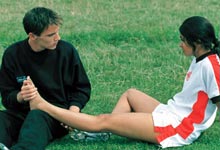
|
A field day with Gurinder Chadha
The Bend It Like Beckham director plays straight
|
Gurinder Chadha, director of Bend It Like Beckham plays straight, very straight.
Whether it is defending her movie about being stereotyped or what constitutes being Indian, as Albert Botelho discovers:
Let us begin with the movie. Its hilarious plot deals with the cultural dissonance of Indians living in Britain and has a soccer slant to it. How did it all come about?
Well, my friend, Guljit Bindra, one of the writers, is a big soccer fan. Many years ago [she] said to me that she would like to write a film about an Indian girl who plays football. I thought it was quite a cute idea and sort of encouraged her to write something.
It was only in 1998 with the World Cup in France that I realised how many people got behind it, especially in Britain. When England lost, it was amazing how the country went into mourning. I had not seen anything like it since Lady Diana's funeral.
I thought, wouldn't it be great to take this national passion, this national fervour? Football is seen as a British, or I should say English national sport. And there was an Indian girl right in the middle of that world.
I got in touch with Guljit and suggested we do something based around David Beckham. I introduced a sister for the girl who was getting married. That made me tackle the Indian obsession of marriage at the same time --- I combined these two national passions.
 Two themes stick out: traditional parents wanting their daughter to perfect making round chapatis
Two themes stick out: traditional parents wanting their daughter to perfect making round chapatis ; the daughter's obsession about bending the ball like Beckham. Do Indians living overseas deal with such issues in real life?
Oh, absolutely! You'd be surprised how many Indians girls actually play football in Britain now. In fact, recently, an Indian girl who plays for Arsenal (the women's team of England's leading football club) was in all the papers because her story mirrored the film.
She was also offered a place in an university in America to train in football professionally. It happens.
But football is a metaphor in the film. Really to represent girls wanting to break out of what is expected of them. And football is such a man's world that it made perfect sense.
It could be any world. The film is really more about daughters wanting to do something different than what is expected. And seeing how the parents come to a position where eventually they understand and end up supporting their kids. Which is very typical of the immigrant experience in Britain.
I wanted to show an alternative side. We are so used to seeing a very traditional father or mother saying, 'you must do this, you must follow your traditions. Otherwise, we are going to break your legs or lock you up.' Then you have kids going, 'Well, we're English, we want to marry Joe English from next door.'
That was the usual stereotype. I just wanted to show how wrong that is for many of us who actually live a very comfortable existence with our families where both sides are actually trying to balance each other, even though we might not have done what our parents wanted of us, but we know what our parents expect of us and vice versa.
There is a wonderful understanding, a wonderful dance both generations do to keep themselves happy, but also keep their kids happy. The film is really a tribute to that, to my parents' generation.
To Indians, it may seem to reinforce a stereotype. To Westerners, it could offer an interesting insight into the mindset of immigrant Indians. What does...
*Cuttin in* But I don't think it reinforces a stereotype. The whole point of the film shows the journey of the father --- actually understanding where [the daughter] is coming from and supporting her. Meanwhile, it also shows the daughter understanding where her parents are coming from
and ultimately wanting to do things only with their support.
 Has Beckham watched the movie? What was his reaction?
Has Beckham watched the movie? What was his reaction?
Yah, Beckham saw the movie. I was lucky enough to be with him when he saw it. He enjoyed it. He laughed a lot. Afterwards, he told me that he really liked the football, of course. He couldn't believe that the girls were not really professional players. He really enjoyed the Indian stuff. He thought it was very insightful.
Was [wife] Victoria with him?
Yes.
What did she think about the movie?
She said it was funnier than East Is East *laughs*. She liked the music a lot. She liked the music so much, she wanted me to put two of her tracks [now an independent artist, Victoria is ex-Spice Girls] in *laughs*.
Are you a soccer fan?
I am a big fan of the World Cup. I love the way this World Cup has come about. I have been lucky enough to experience it in two countries.
I like the international politics that comes into play. It is not just about the sport, it is what it represents. The fact that Korea came so far means so much more than just the Korean football team coming so far.
It was fantastic to see an Asian team taking on European soccer greats. I loved it when France lost to Senegal *laughs*. We were very upset that Beckham, the England team, did not go any further.
But I have to honestly say we were more terrified that Germany might win. So we were very pleased (at Germany losing the final). I think every Englishman or supporter of England or people around the world were supporting Brazil in the final.
 You have a football club in the movie, Hounslow Harriers. Is it fictitious or a real club with women playing for it?
You have a football club in the movie, Hounslow Harriers. Is it fictitious or a real club with women playing for it?
It is a fictitious club. But the girls who play in it are from two different football teams. Half the girls are from Slow Football Team, which is another town just further on from Hounslow. And the other half play for Queens Park Rangers which is a very famous West London football team.
Who is your favourite player other than Beckham?
Well, Ronaldo's pretty special. Ahn (Ahn Jung Hwan of South Korea) is absolutely gorgeous. And (he's got) pretty good soccer skills too.
Indian directors make movies about Indian characters and influences; others make movies with both Western and Oriental influences. Will your future projects be Indian in character?
Well, my last film was not Indian. What's Cooking? was set in Los Angeles.
But before that you had Bhaji On The Beach which was essentially Indian.
That is right. I get offered all kinds of projects. The ones I take are the ones that I feel I can bring something to. If I am writing a project, I want to write it from my perspective. I will continue to write films that come from my kind of version of Indianness which is as much English as it is Indian. But I will also direct other movies, other storylines.
What do you think about the fantastic Indian talent that has been discovered by the West --- writers, musicians, directors?
I think you have to be careful. I find sometimes that Indians from India have a very narrow definition of what Indian is. I think you have to understand that Indian does not necessarily mean what happens or what is defined within the boundaries of the country, India.
I think the Indianness that we have culturally going on in Britain for example is a combination of all kinds of cultural influences, not just Indian.
If you look at the music of Nitin Sawhney, it is a combination of influences that could only have come out from the influences around him which are partly Indian and also other things.
My film has a Punjabi theme, but the family is very much East African Punjabi which is Indian, twice removed. It is also a very English film in the way it has been constructed. In Britain, everyone describes it as a British film.
So it is very interesting that culture is very fluid and in Britain, in particular. I would not say [that of] America, which has a different experience. In Britain, we have a much more fluid definition of our sense of Indianness.
Also, I think it is very important to state here that it was Britain that has given India a new taste in music. Small producers in Southall and Birmingham started creating mixes of Indian music with Western themes that have gone on to influence people from India who are making a big name from that kind of musical trend.
 People like A R Rahman, I think, are influenced by people like Bally Sagoo. Certainly people like Daler Mahendi are directly coming out from people like Malkit Singh from Britain, from Birmingham.
People like A R Rahman, I think, are influenced by people like Bally Sagoo. Certainly people like Daler Mahendi are directly coming out from people like Malkit Singh from Britain, from Birmingham.
I believe that Indians have often a narrow idea of what Indian culture is, when they look at what we are doing in the West.
Are you already thinking about your next project?
Yeah, I have a couple of different projects that I have going at the moment. I have a project based on the novel The Mistress of Spices by a Bengali writer based in San Francisco called Chitra Banerjee Divakaruni. That is a script I adapted with my husband and writing partner, Paul.
We are also writing a musical, which we hope to make very soon. It is a British musical, set in India, England and America, and has a mixed cast of Indian, British and American actors.
|